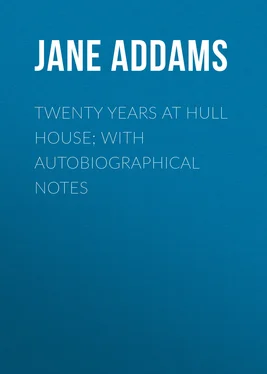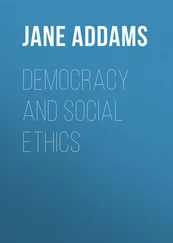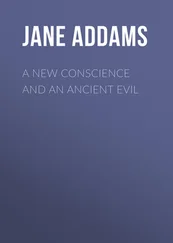Jane Addams - Twenty Years at Hull House; with Autobiographical Notes
Здесь есть возможность читать онлайн «Jane Addams - Twenty Years at Hull House; with Autobiographical Notes» — ознакомительный отрывок электронной книги совершенно бесплатно, а после прочтения отрывка купить полную версию. В некоторых случаях можно слушать аудио, скачать через торрент в формате fb2 и присутствует краткое содержание. Жанр: foreign_prose, История, foreign_edu, foreign_antique, на английском языке. Описание произведения, (предисловие) а так же отзывы посетителей доступны на портале библиотеки ЛибКат.
- Название:Twenty Years at Hull House; with Autobiographical Notes
- Автор:
- Жанр:
- Год:неизвестен
- ISBN:нет данных
- Рейтинг книги:5 / 5. Голосов: 1
-
Избранное:Добавить в избранное
- Отзывы:
-
Ваша оценка:
- 100
- 1
- 2
- 3
- 4
- 5
Twenty Years at Hull House; with Autobiographical Notes: краткое содержание, описание и аннотация
Предлагаем к чтению аннотацию, описание, краткое содержание или предисловие (зависит от того, что написал сам автор книги «Twenty Years at Hull House; with Autobiographical Notes»). Если вы не нашли необходимую информацию о книге — напишите в комментариях, мы постараемся отыскать её.
Twenty Years at Hull House; with Autobiographical Notes — читать онлайн ознакомительный отрывок
Ниже представлен текст книги, разбитый по страницам. Система сохранения места последней прочитанной страницы, позволяет с удобством читать онлайн бесплатно книгу «Twenty Years at Hull House; with Autobiographical Notes», без необходимости каждый раз заново искать на чём Вы остановились. Поставьте закладку, и сможете в любой момент перейти на страницу, на которой закончили чтение.
Интервал:
Закладка:
An instance of the invigorating and clarifying power of Lincoln's influence came to me many years ago in England. I had spent two days in Oxford under the guidance of Arnold Toynbee's old friend Sidney Ball of St. John's College, who was closely associated with the group of scholars we all identify with the beginnings of the Settlement movement. It was easy to claim the philosophy of Thomas Hill Green, the road-building episode of Ruskin, the experimental living in the east end by Frederick Maurice, the London Workingman's College of Edward Dennison, as foundations laid by university men for the establishment of Toynbee Hall. I was naturally much interested in the beginnings of the movement whose slogan was "Back to the People," and which could doubtless claim the Settlement as one of its manifestations. Nevertheless the processes by which so simple a conclusion as residence among the poor in East London was reached, seemed to me very involved and roundabout. However inevitable these processes might be for class-conscious Englishmen, they could not but seem artificial to a western American who had been born in a rural community where the early pioneer life had made social distinctions impossible. Always on the alert lest American Settlements should become mere echoes and imitations of the English movement, I found myself assenting to what was shown me only with that part of my consciousness which had been formed by reading of English social movements, while at the same time the rustic American looked on in detached comment.
Why should an American be lost in admiration of a group of Oxford students because they went out to mend a disused road, inspired thereto by Ruskin's teaching for the bettering of the common life, when all the country roads in America were mended each spring by self-respecting citizens, who were thus carrying out the simple method devised by a democratic government for providing highways. No humor penetrated my high mood even as I somewhat uneasily recalled certain spring thaws when I had been mired in roads provided by the American citizen. I continued to fumble for a synthesis which I was unable to make until I developed that uncomfortable sense of playing two roles at once. It was therefore almost with a dual consciousness that I was ushered, during the last afternoon of my Oxford stay, into the drawingroom of the Master of Balliol. Edward Caird's "Evolution of Religion," which I had read but a year or two before, had been of unspeakable comfort to me in the labyrinth of differing ethical teachings and religious creeds which the many immigrant colonies of our neighborhood presented. I remember that I wanted very much to ask the author himself how far it was reasonable to expect the same quality of virtue and a similar standard of conduct from these divers people. I was timidly trying to apply his method of study to those groups of homesick immigrants huddled together in strange tenement houses, among whom I seemed to detect the beginnings of a secular religion or at least of a wide humanitarianism evolved out of the various exigencies of the situation; somewhat as a household of children, whose mother is dead, out of their sudden necessity perform unaccustomed offices for each other and awkwardly exchange consolations, as children in happier households never dream of doing. Perhaps Mr. Caird could tell me whether there was any religious content in this
Faith to each other; this fidelity
Of fellow wanderers in a desert place.
But when tea was over and my opportunity came for a talk with my host, I suddenly remembered, to the exclusion of all other associations, only Mr. Caird's fine analysis of Abraham Lincoln, delivered in a lecture two years before.
The memory of Lincoln, the mention of his name, came like a refreshing breeze from off the prairie, blowing aside all the scholarly implications in which I had become so reluctantly involved, and as the philosopher spoke of the great American "who was content merely to dig the channels through which the moral life of his countrymen might flow," I was gradually able to make a natural connection between this intellectual penetration at Oxford and the moral perception which is always necessary for the discovery of new methods by which to minister to human needs. In the unceasing ebb and flow of justice and oppression we must all dig channels as best we may, that at the propitious moment somewhat of the swelling tide may be conducted to the barren places of life.
Gradually a healing sense of well-being enveloped me and a quick remorse for my blindness, as I realized that no one among his own countrymen had been able to interpret Lincoln's greatness more nobly than this Oxford scholar had done, and that vision and wisdom as well as high motives must lie behind every effective stroke in the continuous labor for human equality; I remembered that another Master of Balliol, Jowett himself, had said that it was fortunate for society that every age possessed at least a few minds, which, like Arnold Toynbee's, were "perpetually disturbed over the apparent inequalities of mankind." Certainly both the English and American settlements could unite in confessing to that disturbance of mind.
Traces of this Oxford visit are curiously reflected in a paper I wrote soon after my return at the request of the American Academy of Political and Social Science. It begins as follows:—
The word "settlement," which we have borrowed from London, is apt to grate a little upon American ears. It is not, after all, so long ago that Americans who settled were those who had adventured into a new country, where they were pioneers in the midst of difficult surroundings. The word still implies migrating from one condition of life to another totally unlike it, and against this implication the resident of an American settlement takes alarm.
We do not like to acknowledge that Americans are divided into two nations, as her prime minister once admitted of England. We are not willing, openly and professedly, to assume that American citizens are broken up into classes, even if we make that assumption the preface to a plea that the superior class has duties to the inferior. Our democracy is still our most precious possession, and we do well to resent any inroads upon it, even though they may be made in the name of philanthropy.
Is it not Abraham Lincoln who has cleared the title to our democracy? He made plain, once for all, that democratic government, associated as it is with all the mistakes and shortcomings of the common people, still remains the most valuable contribution America has made to the moral life of the world.
[Editor: Mary Mark Ockerbloom]
This chapter has been put on-line as part of the BUILD-A-BOOK Initiative at the Celebration of Women Writers. Initial text entry and proof-reading of this chapter were the work of volunteer Diana Camden.
[Editor: Mary Mark Ockerbloom]
[A Celebration of Women Writers]
"Chapter III: Boarding-School Ideals." by Jane Addams (1860-1935)
From: Twenty Years at Hull-House with Autobiographical Notes. by Jane Addams. New York: The MacMillan Company, 1912 (c.1910) pp. 43-64.
[Editor: Mary Mark Ockerbloom]
CHAPTER III
BOARDING-SCHOOL IDEALS
As my three older sisters had already attended the seminary at Rockford, of which my father was trustee, without any question I entered there at seventeen, with such meager preparation in Latin and algebra as the village school had afforded. I was very ambitious to go to Smith College, although I well knew that my father's theory in regard to the education of his daughters implied a school as near at home as possible, to be followed by travel abroad in lieu of the wider advantages which the eastern college is supposed to afford. I was much impressed by the recent return of my sister from a year in Europe, yet I was greatly disappointed at the moment of starting to humdrum Rockford. After the first weeks of homesickness were over, however, I became very much absorbed in the little world which the boarding school in any form always offers to its students.
Читать дальшеИнтервал:
Закладка:
Похожие книги на «Twenty Years at Hull House; with Autobiographical Notes»
Представляем Вашему вниманию похожие книги на «Twenty Years at Hull House; with Autobiographical Notes» списком для выбора. Мы отобрали схожую по названию и смыслу литературу в надежде предоставить читателям больше вариантов отыскать новые, интересные, ещё непрочитанные произведения.
Обсуждение, отзывы о книге «Twenty Years at Hull House; with Autobiographical Notes» и просто собственные мнения читателей. Оставьте ваши комментарии, напишите, что Вы думаете о произведении, его смысле или главных героях. Укажите что конкретно понравилось, а что нет, и почему Вы так считаете.





![О Генри - Через двадцать лет [After Twenty Years]](/books/415401/o-genri-cherez-dvadcat-let-after-twenty-years-thumb.webp)






